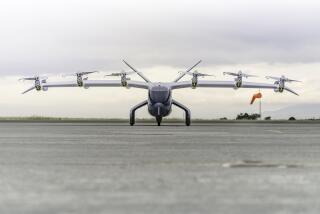Flytenow, the aviation version of Uber and Lyft, is locked in court battle with regulators
- Share via
California-based Flytenow Inc. — the aviation version of the ride-sharing companies Uber and Lyft — is locked in a court battle with federal regulators, who contend the emerging air-pool business amounts to an illegal charter operation.
The company, which started on the East Coast early last year and later moved to Mountain View in Silicon Valley, runs an online bulletin board where private pilots post their flight plans and potential passengers can arrange to fly with them on the condition that expenses are shared equally.
Flytenow’s founders say the operation complies with federal regulations that allow pilots to share the cost of fuel, aircraft rentals and airport fees with travelers or aviation enthusiasts — a practice that was established long before the invention of the Internet.
But the Federal Aviation Administration asserts that flight-sharing is illegal when it involves an online service that can reach a broad segment of the public interested in flying. After receiving an FAA notification to that effect, Flytenow stopped listing flights in late 2014 and went to court.
“It’s OK for pilots to post a written notice at an airport or a college campus with 10,000 students, but if they post the same message online, the FAA says no. Where do you draw the line?” said Matt Voska of San Francisco, a private pilot and a co-founder of Flytenow. “What we are doing is permissible.”
The company’s case was heard late last month in the U.S. Court of Appeals for the District of Columbia Circuit, which handles matters related to federal agencies. A decision is pending.
The biggest risk to society today is the need for the government to keep pace with innovation. This whole concept is now taking off in Europe.
— Alan Guichard, an attorney and co-founder of Flytenow Inc.
Meanwhile, other flight-sharing services, such as Airpooler Inc., which served Boston, Palo Alto and San Diego, have ceased operations at least until the outcome of the case. Airpooler also received a FAA notice that its online operation violated federal regulations.
Before Flytenow shut down its site, the company was fast becoming part of the growing sharing economy that involves hundreds of start-ups in the U.S. Among the more well-known firms are room rental service Airbnb as well as Uber and Lyft, both app-based transportation networking companies.
Flytenow’s founders say their online service has attracted about 25,000 members, including travelers, flying enthusiasts and several thousand private, commercial and air transport pilots who filled the website with their personal flight plans.
“The biggest risk to society today is the need for the government to keep pace with innovation,” said Alan Guichard, an attorney and co-founder of Flytenow. “This whole concept is now taking off in Europe.”
Voska estimated that he made about a dozen trips to carry passengers to such destinations as Half Moon Bay, Merced, Monterey, Napa and Sonoma. He said expenses were shared equally by him and his passengers, who also paid a separate $10 fee to Flytenow.
Flytenow officials estimate that the cost of a typical round trip ranged from $60 to $70 per passenger, hundreds of dollars cheaper than an air charter. For example, they said a round trip from Palo Alto to Lake Tahoe would cost about $100 a person, while a comparable flight on Southwest Airlines from San Francisco to Reno/Tahoe would run $190 to $227 with an advanced reservation for the cheapest option.
“Tons of people want to use this,” Voska said. “They want to see it happen.”
FAA officials declined to comment on the case. The agency contends in court papers, however, that by accepting paying passengers through Flytenow’s website, pilots have been conducting illegal commercial flight operations without government scrutiny or proper certification.
The FAA claims that pilots who list flights online are holding themselves out to the public as available to provide air travel for compensation, in this case expenses.
As such, the government argues that the pilots must obtain commercial operator’s licenses, known as Part 119 certificates, which subject them to tougher safety requirements and additional qualifications.
FAA attorneys also assert that the expense-sharing rule that Flytenow relies on allows only “casual” cost sharing by pilots who wish to take some friends or acquaintances on a trip. In contrast, they say, the service’s website was designed to attract the attention of a broad segment of the public.
Flytenow disagrees, arguing that the company and its participating pilots should be exempt from the FAA’s commercial licensing requirements
Guichard said obtaining an operator’s certificate would be difficult for private pilots, who would have to develop a business plan, have at least 1,500 hours of flight time, train to get a commercial pilot’s license and submit to additional FAA inspections.
“This would be cost-prohibitive for a private pilot who is only sharing expenses,” Guichard said.
Company lawyers note that since the expense-sharing rule was adopted in 1963, private pilots have long posted written notices of their planned trips at airports, kiosks, colleges and universities as well as other public places.
Jon Riches, a Flytenow attorney with the Goldwater Institute in Arizona, said pilots using the website have complied with the rule because they split expenses and do not make a profit. They also determine when and where they will fly, not the passengers or Flytenow, he added.
The company further contends that both pilots and passengers have met an additional requirement of having a common purpose for the trip, such as conducting some kind of personal business — an indication the flight is not merely to transport passengers.
“This is just people in small planes sharing expenses,” Riches said. Given the FAA’s position, “Sully Sullenberger and Neil Armstrong could not fly passengers using Flytenow.”
Follow @LADeadline16 for aviation and transportation news.
ALSO
What’s holding up the start of Uber and Lyft pickups from LAX?
Cord-cutting: It’s easier (and cheaper) than you think
Bending razor-thin glass to tech’s future needs
More to Read
Sign up for Essential California
The most important California stories and recommendations in your inbox every morning.
You may occasionally receive promotional content from the Los Angeles Times.











